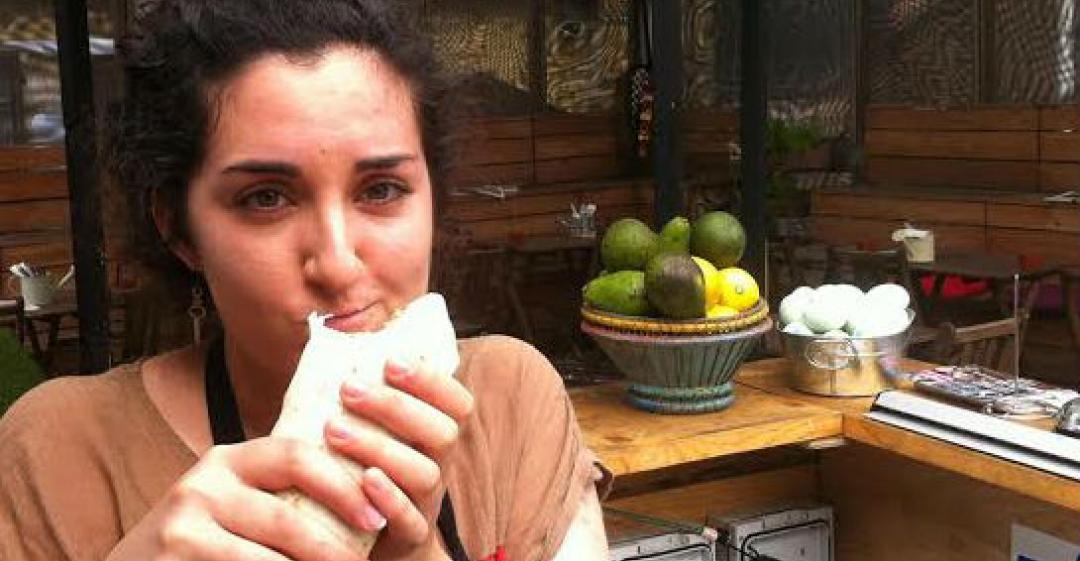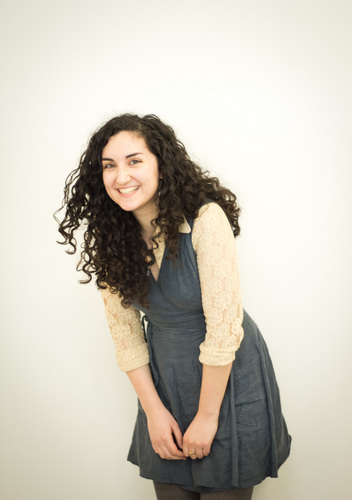"I knew my heart wasn't in my current job, and that if I really wanted to dedicate myself to something, I needed to change."

What work were you doing previously?
I guess I've always been a bit of a career shifter, but I think a lot of people are these days.
I started out studying museums and the art world, working in a gallery and museum during my undergraduate degree as an invigilator and tour guide. By the end of my degree, I had become pretty disenchanted with that world.
Thanks to a bit of serendipity, I switched directions and ended up working as the community manager for a social innovation tech and design company called FutureGov. They specialised in creating web-based services to improve local government.
What are you doing now?
For the last two years, I've been working with food, running a pop-up restaurant and freelancing in a variety of kitchens.
I've also just started an MA in Anthropology of Food at The School of Oriental and African Studies (SOAS) in London.
Why did you change?
I found the work at FutureGov interesting; they are a great company doing awesome things.
But I knew local government wasn't my passion. I knew my heart wasn't in my current job, and that if I really wanted to dedicate myself to something, I needed to change.
I'd started a pop-up restaurant with a friend on the side while I was still in the day job, and I just fell in love with it. The more I did, the more I realised it was the direction I wanted to head in.
When was the moment you decided to make the change?
The company decided to restructure, and they asked everyone in the company what they really wanted to do with their time.
We had a month to think about it before giving a response, but almost immediately I knew that what I really wanted to do was cook, and to be involved with food somehow.
I was at the point where I was starting to get offers to cater and be involved in food projects, but didn't have the time because of my full-time job. I figured that if I didn't take the plunge, I might miss my chance to make a real go of this food thing.
Are you happy with the change?
Completely.
I haven't really looked back. I love everything about the food world. Even after an 18-hour day on my feet, running around getting ingredients, cooking a full pop-up meal, hosting said meal and cleaning up, I still want to do it all again. I never get sick of food.
Now that I'm taking some time to step back, studying food and how it fits into our world, I'm reminded just how complex a topic it is. There are so many more aspects of it I have yet to explore. Plus, I now get to geek out about food with other people who are equally obsessed all the time!
What do you miss and what don't you miss?
I'm not really sure if I miss anything.
It's not that I didn't like what I was doing, but the things I enjoyed most – interacting with community members and organising events – are things that I still get to do now.
I don't miss sitting at a desk all day; although, ironically, as a student (even one studying food), you spend an awful lot of time sitting, reading and writing.
How did you go about making the shift?
I pretty much dove in headfirst!
I really didn't have much of a plan. After I handed in my notice, I ended up going back to visit my family in the US for a month, to take a break and prepare myself for the unknown.
When I came back to London, I had two or three catering jobs in the calendar and nothing else. But I quickly and very openly announced that I'd made a career shift; I was available for collaborating on any and all food-related things. I also scanned Twitter and ended up getting a couple of freelance cooking jobs with more experienced people to get more practical experience in kitchens.
I attended every food-related event I could find, visited markets, got in touch with food organisations, connected with friends of friends – anyone I could find to start building a network – and got to know how the whole London food system worked.
While all this was happening, I started getting more bookings, with every event leading to a new client. Slowly but surely, things started to snowball.
What didn't go well? What 'wrong turns' did you take?
Because I started this with no plan, as a self-taught cook with no real experience in a professional kitchen, EVERYTHING was a huge learning curve.
I made a lot of mistakes – luckily, none that showed up on the dining table, but things that made my life a lot harder than it had to be.
I learnt the hard way things like how to plan a menu to cut down on work during the event (unlike the time I planned a five-course meal where everything had to be done at the last minute); selling tickets up front for pop-ups rather than taking payment at the door (I once ended up with twelve portions of slow-roasted duck hash left over and zero profit after half my bookings never showed up to an event); and so many more.
Knock on wood, I've never had any true disasters, but there have definitely been a lot of stumbles and lessons learned along the way.
I was also involved in a restaurant opening about six months into cooking full time. I was far out of my depth and experience, and the work environment in general was difficult. It was somewhat of a traumatising time in my life, but ultimately I learned a lot about myself and the kind of a job and atmosphere I didn't want to work in.
How did you handle your finances to make your change possible?
I was very lucky to have savings and family support, which gave me a buffer for those first few months.
What was the most difficult thing about changing?
I think one of the most challenging things was trying to find that work–life balance – getting enough work to pay the rent, but not letting it take over every hour and moment of the day, week and year.
It was especially difficult, because it's something I am so passionate about, not to get lost in the spiral of work; I found it hard to remember to take moments to catch my breath, to spend time with friends and family.
I definitely burnt out in my first year, because I was doing what I loved and forgot that, even then, I still needed to take a break every once in a while.
What help did you get? 
I had and still have such an incredibly supportive network of professional acquaintances, friends and family.
Many of my former colleagues came to me for catering when they had professional events – people who trusted me enough to give me a chance and book me for events never having tasted my food.
Friends connected me with others they knew who were starting out in food (like the amazing crew at Kitchenette) and got me involved in some awesome collaborations, like the Intimacy Lab at the Barbican, and even cooking a private dinner for Delia Smith! They came along to pop-ups and shamelessly promoted my endeavours.
Even though my family are across the ocean, they've always been supportive of my decision and been there whenever I've needed them. I honestly couldn't and wouldn't have been able to make this shift successful were it not for every one of them.
What have you learnt in the process?
The biggest thing I've taken to heart more recently is that, in the grand scheme of things, I know very little.
There is always more to learn; there are always more people to learn from.
Going it alone is a challenging and worthwhile experience, but it's also so important to be aware of my limitations, and to be OK with asking for help. That's why having a strong supportive network has been so important.
What do you wish you'd done differently?
I don't know if there are things I necessarily wish I'd done differently.
Every challenge, twist, turn, and setback has led me to where I am now, teaching me many valuable lessons along the way. I certainly didn't put myself on the easiest road, but it's led to incredible, wonderful opportunities, people, and experiences that I wouldn't swap for anything.
What would you advise others to do in the same situation?
I'm still very much in the learning process, and so am still looking for advice myself, but I'd say go with your gut and be open.
The most incredible experiences I've had so far were ones I never could have planned.
Talk to as many people as you can about what you're trying to do, and follow up when they offer a connection or helping hand. Build a network within your desired industry, but hold on to your existing networks too. They may end up being more valuable and useful than you could ever imagine!
Do things you are scared of. Stretch yourself beyond your comfort zone. If you're going to take the plunge into a new career, you may as well go the whole hog! Being a little scared is a great way to light a fire under your feet and keep yourself focused. It can also put you into unlikely situations where you discover you are capable of way more than you ever thought possible.
It never hurts to ask, no matter how far-fetched something may seem. If there is a person you want to meet, a space you want to use, a project you want to collaborate on, get in touch – the worst that can happen is that they say no. Just asking has led me to run pop-ups in some pretty amazing spaces, including the Clock Tower at St Pancras.
What resources would you recommend to others?
If you're thinking about starting a food business, check out Kitchenette – a food start-up incubator based in London, which helps people test, develop and launch new food businesses. They've just opened up a permanent restaurant space where they profile new chefs and restaurant concepts, too!
What lessons could you take from Rachel's story to use in your own career change? Let us know in the comments below.



